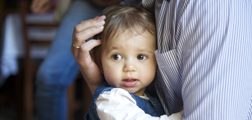Effects

Young children depend exclusively on parents/caregivers for survival and protection—both physical and emotional. When trauma also impacts the parent/caregiver, the relationship between that person and the child may be strongly affected.
Early childhood trauma generally refers to the traumatic experiences that occur to children aged 0-6. Because infants' and young children's reactions may be different from older children's, and because they may not be able to verbalize their reactions to threatening or dangerous events, many people assume that young age protects children from the impact of traumatic experiences. A growing body of research has established that young children may be affected by events that threaten their safety or the safety of their parents/caregivers, and their symptoms have been well documented. These traumas can be the result of intentional violence—such as child physical or sexual abuse, or domestic violence—or the result of natural disaster, accidents, or war. Young children also may experience traumatic stress in response to painful medical procedures or the sudden loss of a parent/caregiver.

Young children depend exclusively on parents/caregivers for survival and protection—both physical and emotional. When trauma also impacts the parent/caregiver, the relationship between that person and the child may be strongly affected.

Due to the particular developmental risks associated with young children's traumatic experiences, it is essential that vulnerable children be identified as early as possible after the trauma.

As recognition has grown about the prevalence and impact of trauma on young children, more age-appropriate treatment approaches have been developed and tested for this population.